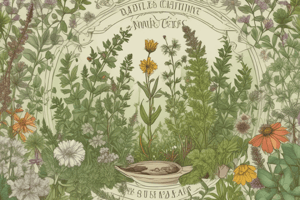Podcast
Questions and Answers
What is the pH level of the stomach?
What is the pH level of the stomach?
What is the primary goal of phase 1 metabolism?
What is the primary goal of phase 1 metabolism?
What is the term for the study of a drug's mechanism of action?
What is the term for the study of a drug's mechanism of action?
What is the term for a substance that initiates a physiological response when combined with a receptor?
What is the term for a substance that initiates a physiological response when combined with a receptor?
Signup and view all the answers
What is the term for the dose at which a drug causes death in 50% of individuals?
What is the term for the dose at which a drug causes death in 50% of individuals?
Signup and view all the answers
What is the term for the process by which a drug is converted to its metabolites?
What is the term for the process by which a drug is converted to its metabolites?
Signup and view all the answers
What is the term for the amount of the administered dose of a drug that reaches the systemic circulation in an active form?
What is the term for the amount of the administered dose of a drug that reaches the systemic circulation in an active form?
Signup and view all the answers
What is the term for the circulation of a drug from the liver to the gut and back to the liver?
What is the term for the circulation of a drug from the liver to the gut and back to the liver?
Signup and view all the answers
What is the term for the process by which the body eliminates a drug?
What is the term for the process by which the body eliminates a drug?
Signup and view all the answers
What is the term for the therapeutic index, which is a measure of a drug's safety?
What is the term for the therapeutic index, which is a measure of a drug's safety?
Signup and view all the answers
Which of the following bacteria is an urgent threat?
Which of the following bacteria is an urgent threat?
Signup and view all the answers
Which antibiotic class would be contraindicated in a patient with a penicillin allergy?
Which antibiotic class would be contraindicated in a patient with a penicillin allergy?
Signup and view all the answers
What is a mechanism by which bacteria may develop antibiotic resistance?
What is a mechanism by which bacteria may develop antibiotic resistance?
Signup and view all the answers
What is a key principle of antibiotic stewardship?
What is a key principle of antibiotic stewardship?
Signup and view all the answers
Which of the following is an example of a concerning threat?
Which of the following is an example of a concerning threat?
Signup and view all the answers
What is a potential adverse effect of antibiotic treatment?
What is a potential adverse effect of antibiotic treatment?
Signup and view all the answers
Which antibiotic class acts by inhibiting bacterial protein synthesis?
Which antibiotic class acts by inhibiting bacterial protein synthesis?
Signup and view all the answers
Which of the following is an example of a watch list threat?
Which of the following is an example of a watch list threat?
Signup and view all the answers
What is the characteristic of an antibiotic with a narrow antimicrobial spectrum?
What is the characteristic of an antibiotic with a narrow antimicrobial spectrum?
Signup and view all the answers
What is the target of penicillin V?
What is the target of penicillin V?
Signup and view all the answers
What is the recommended dosage of penicillin V for an adult?
What is the recommended dosage of penicillin V for an adult?
Signup and view all the answers
What is the common adverse effect of penicillin V?
What is the common adverse effect of penicillin V?
Signup and view all the answers
What is the classification of penicillin V based on its antimicrobial spectrum?
What is the classification of penicillin V based on its antimicrobial spectrum?
Signup and view all the answers
What is the recommended duration of treatment with penicillin V?
What is the recommended duration of treatment with penicillin V?
Signup and view all the answers
What is the formulation of penicillin V?
What is the formulation of penicillin V?
Signup and view all the answers
What is the weight-based dosage of penicillin V?
What is the weight-based dosage of penicillin V?
Signup and view all the answers
What is the frequency of penicillin V administration?
What is the frequency of penicillin V administration?
Signup and view all the answers
Study Notes
Herbal Actions Used to Treat Colds
- Immunostimulant: activates the immune system to help fight off infection
- Diaphoretic: induces sweating
- Antitussive: soothes and relieves coughs
- Antispasmodic: relaxes smooth muscles
- Expectorant: liquifies respiratory secretions to facilitate the expulsion of phlegm and mucous
- Mucolytic: helps to break down mucous and loosen thick bronchial secretions
- Demulcent: soothes irritated mucous membranes
- Antimicrobial: destroys or inhibits the growth of microorganisms
- Antiadherance: prevents microorganisms from attaching and thus infecting the cells of the mucous membranes
- Antipyretic (syn. Febrifuge): reduces a fever
- Lymphatic: promotes the proper functioning of the lymphatic system
Herbs Used to Treat Colds
- Echinacea
- Latin: Echinacea purpurea/angustifolia/pallida
- Plant part: Root and herb
- Indications: prevent and treat common cold, flu, URTIs, vaginal candidiasis, UTIs
- Actions: Immunostimulant, antimicrobial
- Barberry
- Latin: Berberis vulgaris
- Plant part: Root
- Indications: general infections, GI infections, hepatic/gallbladder conditions, constipation, type 2 diabetes, PCOS, inflammatory skin conditions
- Actions: Hepatic, cholagogue, antimicrobial, bitter, antiinflammatory, alterative, endocrine modulator
- Coptis / Goldenthread
- Latin: Coptis sinensis
- Plant part: Root
- Indications: chronic or acute skin characterized by inflammation, acute GI infections, chronic sinusitis, hepatitis
- Actions: antimicrobial, anti-inflammatory, hepatic, bitter
- Yellow Dock
- Latin: Rumex crispus
- Plant part: Root
- Indications: Chronic skin conditions, constipation, convalescence
- Actions: Alterative, laxative, hepatic, astringent, mild adaptogen, blood purifier and builder
- Red Clover
- Latin: Trifolium pratense
- Plant part: Flowers, aerial parts
- Indications: skin conditions, PCOS, irregular menses, menopausal hot flashes
- Actions: Alterative, lymphatic, mild female endocrine modulator
- Withania
- Latin: Withania somnifera
- Plant part: Root
- Indications: Fatigue, nervous exhaustion, chronic inflammatory disease, anemia, lowered libido, convalescence, hypothyroid presentations
- Actions: Adaptogen, hypotensive, immune modulator, anti-inflammatory, nootropic
Nutrition and Colds
- Dietary Sugar
- Impacts immune function
- Decreases phagocytic capacity of neutrophils
- Enough Dietary Protein
- Deficiency impairs immune function and increases infections
- Amino Acids are important for immune function
- Honey for Healing
- Natural antimicrobial properties
- Decreases inflammation
- Probiotics
- Supports healthy microbiome
- Important for immune function
Depression and Mood Regulation
- Diet and Mood Regulation
- Blood sugar balance
- Weight management
- Stimulants
- Food sensitivities
- Antioxidants
- Intake is associated with improved depression and anxiety
- Spices
- Saffron: effective in reducing depressive symptoms
- Turmeric: curcumin lowers anxiety scores
- Omega-3 Fatty Acids
- Beneficial effects on depression
- 5-HTP
- Tryptophan is important for brain function
- B Vitamins
- Important for anabolic and catabolic cellular processes
- Supplementation may reduce anxiety and depression
- Magnesium
- Deficiency is common among people with depression
- Supplementation may reduce depressive symptoms
- Vitamin D
- Could reduce risk of depression by reducing inflammation and regulating mood
- Serum vitamin D levels correlate with clinical depression
Pharmacology and Bioavailability
- Bioavailability
- Amount of the administered dose of a drug that reaches the systemic circulation in an active (unchanged) form
- Influenced by several factors
- Distribution
- Tissue targets are influenced by size of the organ, blood flow, drug solubility, and protein binding
- Metabolism
- Enzyme-catalyzed conversion of drugs to their metabolites
- Primary goal is to inactive or detoxify foreign substances and prepare them for excretion
- First Pass Effect
- Drugs absorbed via the gut reach the liver via the portal vein before entering the systemic circulation
- The degree to which the drug is inactivated by liver enzymes prior to entering the systemic circulation substantially alters the drug's bioavailability
- Phase 1 Metabolism
- Primary goal is to introduce or open up a binding site for hydrophilic compounds to be added later by phase II mechanisms
- Oxidative reactions are the most common
- Microsomal cytochrome P450 (CYP450) system is involved
- Phase 2 Metabolism
- Not all drugs require phase I metabolism prior to phase II
- These reactions essentially conjugate a water-soluble molecule to the spot opened up by phase 1 reactions
- In many instances, this means conjugating something to an available hydroxyl group
- Enterohepatic Circulation
- Glucuronide conjugates are excreted in bile
- Some commensal gut bacteria have glucuronidase enzymes that can cleave the glucuronide off the metabolite, resulting in the parent drug being able to be reabsorbed
- Elimination
- Most water-soluble drug metabolites are excreted by the kidneys
- Various mechanisms exist throughout the sections of the nephron
- Lipid-soluble drugs are excreted in the distal tubule if they're small enough
- Lipid-soluble drug metabolites and glucuronide-conjugates are excreted by the liver into bile and excreted in feces
Antibiotic Stewardship
- Antibiotic stewardship is essential to prevent antibiotic resistance.
Mechanisms of Antibiotic Resistance
- Bacteria may develop resistance to antibiotics through various mechanisms.
- Antibiotic resistance can lead to urgent threats, concerning threats, and watch list threats.
Classification of Antibiotics
- Antibiotics can be classified into three main categories based on their antimicrobial spectrum:
- Narrow: Active against a single species or limited group of pathogens.
- Broad: Active against a wide range of pathogens.
- Extended: In between narrow and broad spectrum.
Antibiotic Examples
- Penicillin V:
- Narrow spectrum antibiotic.
- Oral suspension.
- Adverse effects: GI upset, nausea, vomiting, diarrhea, and rash.
- Rare cases: can cause anaphylaxis.
- Target: Group A streptococcus pharyngitis.
- Dosage: > 27 kg: 300 mg TID or 600 mg BID for 10 days.
Antibiotic Resistance Threats
- Urgent threats:
- Carbapenem-resistant Acinetobacter.
- C.auris.
- C.difficile.
- CRE.
- N.gonorrhoeae.
- Concerning threats:
- Erythromycin-resistant group A Streptococcus.
- Clindamycin-resistant group B Streptococcus.
- Watch list:
- Azole-resistant A. fumigatus.
- Drug-resistant M. genitalium.
- Drug-resistant B. pertussis.
Studying That Suits You
Use AI to generate personalized quizzes and flashcards to suit your learning preferences.
Description
Learn about the main herbal actions used to treat colds, including immunostimulant, diaphoretic, antitussive, antispasmodic, expectorant, and mucolytic actions.





